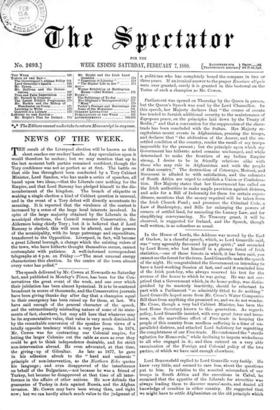In the House of Lords, the Address was moved by
the Earl of Onslow, in a cheerful speech, which, as Lord Granville said, was "very agreeably flavoured by party spirit ;" and seconded by Lord Rosse, who lost himself in a gloomy forest of Irish statistics,—one of those forests in which, it has been said, you cannot see the forest for the trees. Lord Granville made the speech of the night. He congratulated the Government on intending to have a hard-working Session at last, and said it reminded hint of the Irish post-boy, who always reserved his trot for the avenue of the house to which he was going. He was not sur- prised that a Government which, in its home policy, was distin- guished by its masterly inactivity, should be reluctant to part with a Parliament "so admirably fitted to do nothing." Lord Granville hoped more from Mr. Cross's Water Companies Bill than from anything else promised us, and we do not wonder. Mr. Cross, though a very had Cabinet Minister, has been the best Home Secretary known to this generation. As regards policy, Lord Granville insisted, with very great force and terse- ness, on the marvellous effect of Free-trade in keeping the people of this country from needless suffering in a time of un- paralleled distress, and attacked Lord Salisbury for regretting the completeness of our Free-trade. He condemned the "sterile agitation for Home-rule," while declining to impute wickedness to all who engaged in it; and then entered on a very able examination of the Foreign and Colonial policy of the two parties, of which we have said enough elsewhere.


































